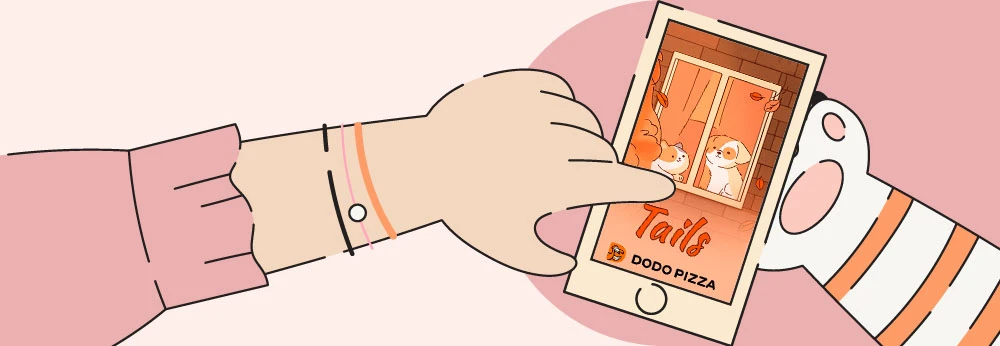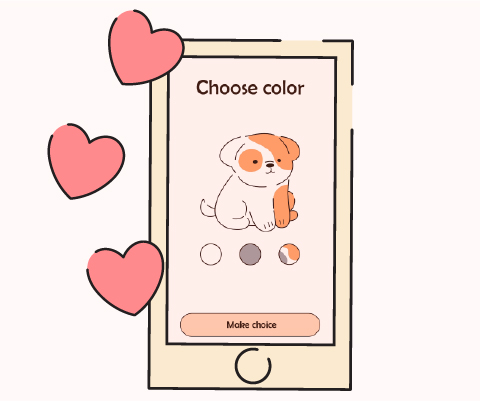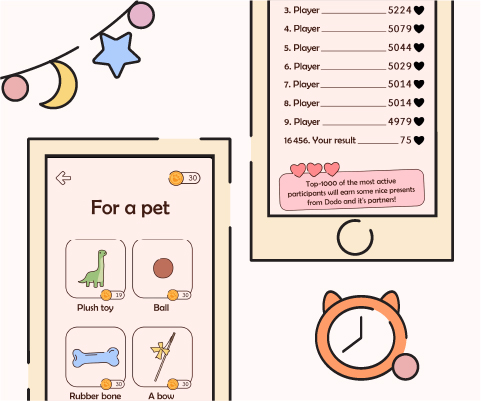.jpg?2026-02-17T14:47:30.411Z)
When Leroy Merlin ran out of hands, InAppStory became the extra ones

Success Story: How Dodo company launched new campaign with "Tails" game and helped animal shelter?
Mark Polskii
Author @ InAppStory
Have you ever played or heard of Tamagotchi? Created by Bandai in 1996, the concept of a virtual pet inside a portable device that consumers must take care of has blown the minds of young audiences in the early 2000s. A similar game has been integrated with one of our close collaborators, Dodo Brands, who decided to launch an exciting marketing campaign together with an animal non-profit organization. Below is a brief overview of yet another one of the InAppStory & Dodo Brands success stories!
What is the “Tails” game and what is it all about?

In 2022, with the launch of a new brand manifesto, the Dodo Pizza company devised a marketing campaign called "Comfort Zone". The supporting in-app game called "Tails" was just a small part of it. The main idea of the campaign was to create a comfortable, cozy space for all Dodo customers and increase awareness for those who are not yet familiar with the brand. In autumn, many people get even more tired at work or school, as the end of the year approaches. Dodo decided to focus on communication that would not push customers to make extra purchases or commit to casino-like predatory mechanics. Instead, Dodo wanted to visualize a place where a client can relax and enjoy their time, providing even more care than usual. The same idea and theme were also incorporated into every part of the Dodo Pizza brand, including pizzerias and outdoor promotions.
We came up with a two-part communication as a way to unite our business goals with our brand positioning. Most of our trade-marketing visuals or OOH advertisement for the campaign did not even promote our product or our game per se”, – explains Anastasiia Bestsenko, the lead manager of Dodo Brands for the project, – “Instead, we asked the people reading the ads to smile more or made a little joke about autumn leaves. It was unusual and very alluring to our clients – we wanted to make them feel valid not just as a customer but as a human. And it worked.
The “Tails” game is a way for Dodo to create a virtual comfort zone for users within their app. The company wanted to avoid aggressive sales mechanics and opted for a less direct, more narrative-driven approach to attract and retain customers. That way users would visit the app more often and remember the new brand positioning while associating pleasant experiences with the company. The main limit was time, as the Dodo team has completely reiterated the campaign concept several times, and therefore the deadlines were very tight.
The implementation phase
Initially, the idea of partnering with a large and trusted charity foundation came during the concept development process. Before that, Dodo had already cooperated with a notable charity foundation (the "Big Brothers, Big Sisters" foundation, helping orphans from around Russia to socialize), so they knew exactly that such a collaboration could be mutually beneficial and pleasant. The team was deeply inspired to cooperate with the "Kotodetki" non-profit organization after they thoroughly studied the current situation among various similar firms and got acquainted with their managers.
The resulting marketing campaign could be divided into two parts: communication with the client (about their feelings, desires, and emotions), which consisted of peculiar messages from Dodo to their consumers in various, unexpected spots (for example, on billboards, bus stops, or banners in their pizzerias) and promotional mechanics, a mini Tamagotchi game and promotional products that added game currency with each purchase.

The “Tails” game is a fairly simple Tamagotchi, in which users acquire their pet (a cat or a dog of their choice) and carefully observe its life and growth. At the same time, users can interact with them in different ways (e.g., feeding or playing). Together with our team, Dodo tried to make the game a little more varied. Thus, we added a store where users can buy furniture and change the design of their virtual rooms and arrange new toys for pets. We also added a “Memories” feature, where users could collect and review unique hand-drawn illustrations of their pets, which they receive by logging into the game on random days of the week. Every day, users had the opportunity to feed their pets. For each such feeding, Dodo transferred 1 ruble to the Kotodetki fund, a charity foundation that provides shelter, food, and homeless animals across the country.
“We paid attention to every detail,” – recounts Anastasia Goryavina, a brand manager working on the project, – “Users could pet their cats and dogs, engage with them on multiple levels. Every day, pets send cute notifications to their owners, expressing gratitude to the users and giving them pleasant emotions”.
Users could also play a game where the pet runs away from the vacuum cleaner, or they could train them some tricks in another small and fun mini-game. And all this was available without spending money – anybody with the app could just enjoy the game. But if players wanted to quickly earn coins for purchases in the in-game store, they could buy special products at the pizzerias.
The main challenge during the campaign was to balance our tone of voice (we had to engage in dialogue with the client in which we pay more attention to them and their needs rather than to ourselves) and promotional mechanics (a game that involves creating a desire to buy something).
“Initially, we were supposed to make a sequel to one of our first games, Dodomania. And it was halfway down the development process that we saw the contradictions between our new positioning and the underlying implications of the game that promotes aggressive spending and casino-like ardor,” – explains Anastasiia. According to her, the idea of a Tamagotchi came after several intense brainstorming sessions, when someone on the team combined the value of care with the intent to create simple yet engaging gameplay focused on retaining the attention of the player.
The Dodo team took over the development of the narrative and the overarching marketing campaign. Meanwhile, our team assisted with the gameplay design, game economics, and the assembly of the project itself. This wasn't our first project together, and the build-up trust would permit us to separate and streamline different aspects of game development. The main metrics we decided to track were the order frequency of active customers, active usage time, number of sessions, and the overall number of users. It took around 3,5 months from the concept generation to the launch of the entire marketing campaign.
Business results: metrics & satisfaction
After the intended marketing campaign had successfully come to an end, the “Tails” game became an absolute hit among Dodo customers, with 456 thousand active players (the previous record was set at 192 thousand). Among active customers, there was a strong increase in order frequency (on average, such users made 1,5 orders more than customers who didn't participate in the promotion), as well as significant growth of LFL revenue (up to 16%) and orders (up to 50%). The conversion rate of game Stories was 22.7% while the average session time was 73 seconds.
In addition, Dodo collected $25,000 together with the clients, "rounded" it up a bit, and sent it to the “Kotodetki” foundation, so caring about virtual animals meant caring about real homeless animals. Anna Belousova, the director and founding member of the fund, says that it roughly translates to 6 months' worth of food for all the animals they shelter and more than 100 visits to a veterinarian for animals that need medical attention. Yet the most important result is the happiness of the customers. Together with Dodo Brands, we managed to create a wonderful, engaging, and memorable campaign that fitted perfectly into Dodo Pizza's new positioning and was also executed quite well in terms of both product quality and performance. Even though it was not an easy experiment, the Dodo team was satisfied with the campaign results and its creativity.

